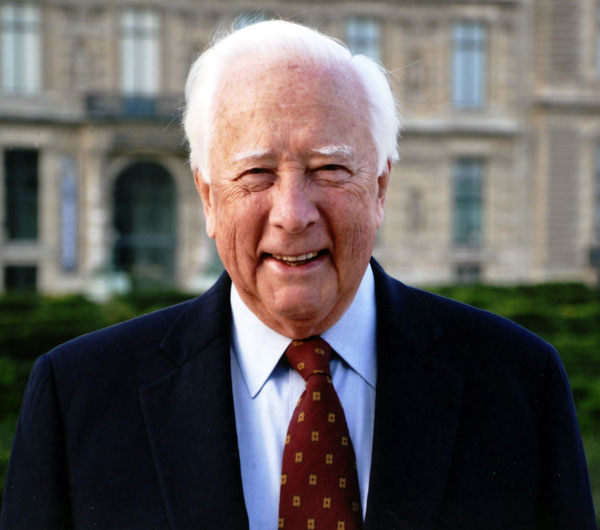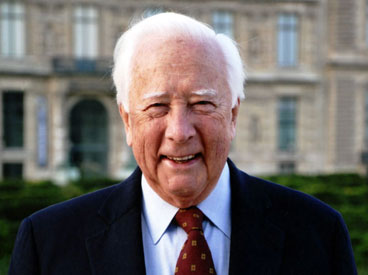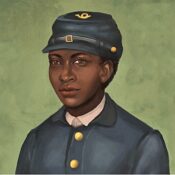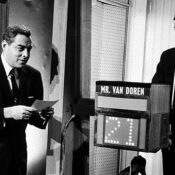
of obscure provisos. History is about people,” says McCullough.
Photo courtesy William B. McCullough.
What happened to the study of American history? It used to be that grade schoolers were bombarded with names and dates, major battles, and a degree of patriotic myth-making. The basic tales of American identity were hammered home through stories: Plymouth Rock, the Salem witch trials, Hamilton’s duel, Honest Abe, Teddy and the Rough Riders, and on through World War II.
But somewhere along the way, learning American history became less important than math and reading scores on standardized tests. Today, talk of STEM education (that’s Science, Technology, Engineering, and Mathematics) is all the rage. And in the effort to offend no one—conservative or liberal, Civil Rights activist or Klan sympathizer—history textbooks became watered down, vague.
The result? American kids—including those “kids” who were educated in the 1970s, ’80s, and ’90s—are historically illiterate, says historian David McCullough: “High school and college-educated young people today simply do not know the facts of American history. They don’t know what happened, or why, or who was involved.”
The research backs him up. A recent study by the U.S. Department of Education found that only 20 percent of fourth graders, 17 percent of eighth graders, and 12 percent of 12th graders showed “solid academic performance” on U.S. history exams. And the Intercollegiate Studies Institute study likewise showed that college seniors averaged 54.2 percent on a civic literacy test.
McCullough, 80, is the author of numerous books, including best-sellers on John Adams and Harry S. Truman. He’s won the Pulitzer and the National Book Award twice (each), and received the Presidential Medal of Freedom. Many remember him as host of American Experience on PBS, and if you heard him speak, you’d certainly recognize his distinctive voice from narrating countless documentaries, including Ken Burns’ The Civil War.
Question: You use the term historical illiteracy. Is the younger generation today really that different from those of the past?
David McCullough: After a lecture I delivered at a Midwestern university of considerable reputation, a sophomore came up to thank me for coming to campus. She said—and I’ve never, ever forgotten it—that she was glad I’d come, because until that day, she’d never realized that the original 13 colonies were all on the East Coast. Now—how in the world? The tendency is to laugh because if you laugh you won’t cry. But it makes me ask: What have we been doing so wrong that this bright young American can be this far along in a college education and be so uninformed?
Q: Okay, but that’s just one person. Is the problem really so widespread?
DM: My experiences demonstrating this go back at least 25 years. I have lectured in every state in the country, at the high school and college level. I’ve been a visiting professor at Cornell, Radcliffe, and Yale universities. I have also lectured to larger, more composite bodies of adults, and so I know the extent to which mothers and fathers and grandparents are concerned about this issue. I have five children of my own, and 19 grandchildren. I am steeped in the younger generation, and care tremendously about them. And it’s not uncommon. I’ve had numerous occasions where students don’t know the first thing about historical figures, or even recognize their names—for example, General George C. Marshall. It’s true of any number of historical figures and historical events. They’ve never heard of them. They simply don’t know what happened, or why, or who was involved. This is the case, I’d emphasize, in the very best universities in the country.
If we raise one generation after another with very little interest in history and even less knowledge, we’re accepting a creeping form of amnesia. We’re forgetting the story of who we are, and how we came to be the way we are.
Q: How has this happened?
DM: Firstly: It’s not their fault. Mostly it’s our fault. By that I mean we adults, parents, teachers, leaders in civic institutions and businesses. We are to blame for not making our history central to what we are imparting to young people.
I believe the old adage “Education begins at home.” An interest in history, a desire to stimulate and encourage an interest in history, has to be a part of how we raise our children. One of the best ways is at the dinner table. Bring back dinner table conversation!
I base this in part on my own experience growing up in Pittsburgh. I was one of four sons. We sat down to dinner every night; my grandmother was often there. Sooner or later some current event in Pittsburgh came to light because of something my father, mother, or grandmother would say, and a big discussion would commence. Hearing about fires, railroad strikes, the excitement of the second world war, was part of the way we grew up. Most of my friends in school did the same thing. We were also taught history all the way through school, and we were required to take it in college.
Q: Isn’t that still the case?
DM: No. Something like 80 percent of colleges in the country no longer require history. You can go on through high school, where they call it “social studies” or something else—and not end up with one course in history. And, yes, I think history should be required in college. I am a proponent of teaching history in grade school, too. If you can get them interested in history at that age—and that’s not hard to do—they’ve got it for life.
Q: The complaint about the way history is taught is that it can be just rote memorization—names and dates, battles, and so forth.
DM: History should not be taught in a boring fashion, as it too often is. History is not about dates or memorizing the tenets of obscure provisos. It is not solely the story of politics and military. It is so much more. History is about people. History is human. History is a story. It’s by telling stories that one teaches history, comes to understand history, and grows to love history. It’s about education, art, music, business, science, about love, failure; it’s about families; it’s about human beings. And that’s the way students should be taught it.
Q: How would you reignite an interest in history in the classroom?
DM: It isn’t as though we have to trick them into taking some vile medicine that no one would want to swallow. An interest in history is the most natural thing in the world. I fell in love with history when I realized it was doing the work of a detective to discover the story of what happened. If you give students assignments whereby they make their own discoveries, do their own research, go to the physical place where things happened, and interview people about it—once they get on the case—they can do spectacular work. At Cornell I taught a lecture course where I gave each student a historic photograph. I gave them the minimum of information about the picture. The assignment was to research the photograph, and write a paper about its subject.
One of the photos was of Sergeant York, one of the heroes in the American Army in World War I, and the subject of a movie starring Gary Cooper. The student to whom I’d given that photograph had no idea who Sergeant York was. In conversation, it then became clear he had no idea when World War I occurred. I encouraged the student, told him York was a hero in the war, and that it was an interesting story. When it was time to read this student’s paper, it was one of the best that had been turned in. I was thrilled by it! It could have been published. About 15 years later, I ran into him in Washington, D.C. He told me, “Ever since that project, World War I has been my hobby.” It doesn’t take much to hook young people. You simply have to try.
Become a Saturday Evening Post member and enjoy unlimited access. Subscribe now



